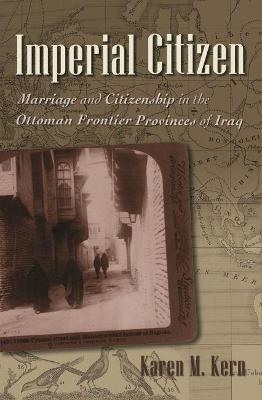
Imperial Citizen
Marriage and Citizenship in the Ottoman Frontier Provinces of Iraq
Seiten
2011
Syracuse University Press (Verlag)
978-0-8156-3285-6 (ISBN)
Syracuse University Press (Verlag)
978-0-8156-3285-6 (ISBN)
- Lieferbar (Termin unbekannt)
- Versandkostenfrei innerhalb Deutschlands
- Auch auf Rechnung
- Verfügbarkeit in der Filiale vor Ort prüfen
- Artikel merken
Examines the intersection between Ottoman colonialism, control of the Iraqi frontier through centralization policies, and the impact of those policies on Ottoman citizenship laws and on the institution of marriage. This fascinating account offers an invaluable contribution to our understanding of the Ottoman Iraqi frontier and its passage to modernity.
Imperial Citizen examines the intersection between Ottoman colonialism, control of the Iraqi frontier through centralization policies, and the impact of those policies on Ottoman citizenship laws and on the institution of marriage. In an effort to maintain control of the Iraqi province, the Ottomans adapted their 1869 citizenship law to prohibit marriages between Ottoman women and Iranian men. This prohibition was an attempt to contain the threat that the Iranian Shi’a population represented to Ottoman control of their Iraqi provinces. In Imperial Citizen, Kern establishes this 1869 law as a point of departure for an illuminating exploration of an emerging concept of modern citizenship. She unfolds the historical context of the law and systematically analyzes the various modifications it underwent, pointing to its farreaching implications throughout society, particularly on landowners, the military, and Sunni women and their children. Kern’s fascinating account offers an invaluable contribution to our understanding of the Ottoman Iraqi frontier and its passage to modernity.
Imperial Citizen examines the intersection between Ottoman colonialism, control of the Iraqi frontier through centralization policies, and the impact of those policies on Ottoman citizenship laws and on the institution of marriage. In an effort to maintain control of the Iraqi province, the Ottomans adapted their 1869 citizenship law to prohibit marriages between Ottoman women and Iranian men. This prohibition was an attempt to contain the threat that the Iranian Shi’a population represented to Ottoman control of their Iraqi provinces. In Imperial Citizen, Kern establishes this 1869 law as a point of departure for an illuminating exploration of an emerging concept of modern citizenship. She unfolds the historical context of the law and systematically analyzes the various modifications it underwent, pointing to its farreaching implications throughout society, particularly on landowners, the military, and Sunni women and their children. Kern’s fascinating account offers an invaluable contribution to our understanding of the Ottoman Iraqi frontier and its passage to modernity.
Karen M. Kern is associate professor of history at Hunter College. She specializes in Ottoman and Middle East history, and law and legal institutions. She has published articles in Turkish Studies Association Journal and the Arab Studies Journal.
| Reihe/Serie | Gender and Globalization |
|---|---|
| Verlagsort | New York |
| Sprache | englisch |
| Maße | 157 x 234 mm |
| Gewicht | 425 g |
| Themenwelt | Geisteswissenschaften ► Geschichte ► Regional- / Ländergeschichte |
| Geschichte ► Teilgebiete der Geschichte ► Wirtschaftsgeschichte | |
| Recht / Steuern ► EU / Internationales Recht | |
| Recht / Steuern ► Öffentliches Recht ► Besonderes Verwaltungsrecht | |
| ISBN-10 | 0-8156-3285-1 / 0815632851 |
| ISBN-13 | 978-0-8156-3285-6 / 9780815632856 |
| Zustand | Neuware |
| Haben Sie eine Frage zum Produkt? |
Mehr entdecken
aus dem Bereich
aus dem Bereich


